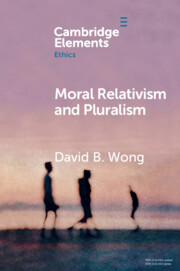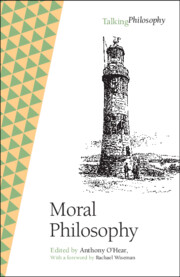Moral Relativism and Pluralism
£17.00
Part of Elements in Ethics
- Author: David B. Wong, Duke University, North Carolina
- Date Published: February 2023
- availability: Available
- format: Paperback
- isbn: 9781009044301
£
17.00
Paperback
Other available formats:
eBook
Looking for an inspection copy?
This title is not currently available on inspection
-
The argument for metaethical relativism, the view that there is no single true or most justified morality, is that it is part of the best explanation of the most difficult moral disagreements. The argument for this view features a comparison between traditions that highly value relationship and community and traditions that highly value personal autonomy of the individual and rights. It is held that moralities are best understood as emerging from human culture in response to the need to promote and regulate interpersonal cooperation and internal motivational coherence in the individual. The argument ends in the conclusion that there is a bounded plurality of true and most justified moralities that accomplish these functions. The normative implications of this form of metaethical relativism are explored, with specific focus on female genital cutting and abortion.
Customer reviews
Not yet reviewed
Be the first to review
Review was not posted due to profanity
×Product details
- Date Published: February 2023
- format: Paperback
- isbn: 9781009044301
- length: 75 pages
- dimensions: 230 x 154 x 5 mm
- weight: 0.15kg
- availability: Available
Table of Contents
1. Why are people so exercised about moral relativism?
2. How should theses about moral relativism be framed?
3. Relationship and community, autonomy and rights
4. Epistemic reasons to delve further into the conflict between relationship-centered and rights-centered moralities
5. An ethical argument for extended inquiry into rivals to one's own ethical views
6. Overcoming stereotypes of relationship-centered moralities
7. Complicating the contrast between relationship and autonomy -centered moralities
8. The underdiscussed question of what morality is
9. A naturalistic approach to understanding why human beings have moralities
10. Putting together moral ambivalence and a naturalistic conception of morality
11. Constraints on the range of viable moralities
12. The social construction of morality: by the individual or group?
13. When people differ in their moral beliefs about an issue, when do they actually disagree?
14. Why we have different beliefs in metaethics
15. How moral reasons enter into the truth conditions of moral judgments help shape our moral motivations
16. Summary of the argument for a pluralistic form of metaethical moral relativism
17. Confused reasoning that is sometimes attributed to those who believe in normative moral relativism
18. An argument for normative moral relativism that is contingent upon the acceptance of certain values and the adoption of metaethical moral relativism
19. Why normative moral relativism cannot be a simple matter of letting others be
20. What is female genital cutting?
21. Accommodation and the fraught issue of abortion
22. Undermining stereotypes of the other side
23. Fostering pluralistic encounters
24. Summary of normative moral relativism.
Sorry, this resource is locked
Please register or sign in to request access. If you are having problems accessing these resources please email [email protected]
Register Sign in» Proceed
You are now leaving the Cambridge University Press website. Your eBook purchase and download will be completed by our partner www.ebooks.com. Please see the permission section of the www.ebooks.com catalogue page for details of the print & copy limits on our eBooks.
Continue ×Are you sure you want to delete your account?
This cannot be undone.
Thank you for your feedback which will help us improve our service.
If you requested a response, we will make sure to get back to you shortly.
×







